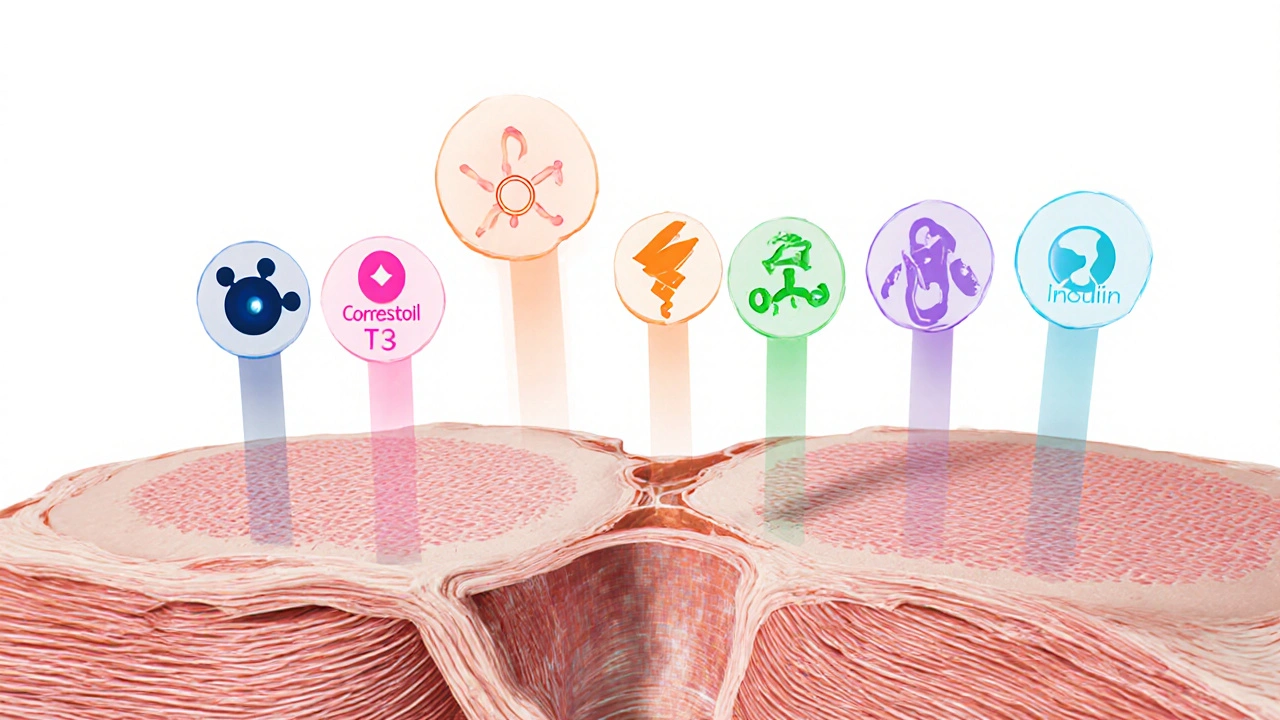Thyroid Hormone – What It Does and Why It Matters
When dealing with thyroid hormone, the hormone released by the thyroid gland that drives metabolism, growth and temperature regulation. Also called thyroxine (T4), it is the body’s built‑in power switch. Thyroid hormone keeps the heart ticking, the brain sharp and the calories burning, so any imbalance feels noticeable fast.
One of the most common ways doctors fix a low‑output engine is with levothyroxine, a synthetic version of the natural hormone designed to restore normal levels. Levothyroxine works because it mimics the exact structure of T4, letting the body use it just like the real thing. This connection—synthetic hormone replaces a missing natural hormone—is a classic example of a medical substitution that restores balance without surgery.
When the thyroid doesn’t make enough hormone, patients develop hypothyroidism, a condition marked by fatigue, weight gain, cold intolerance and slowed heart rate. The body’s metabolism slows down, and everyday tasks can feel exhausting. On the flip side, hyperthyroidism, an overproduction of thyroid hormone that speeds up metabolism, can cause anxiety, rapid heartbeats, and weight loss. Both extremes illustrate how thyroid hormone directly controls the energy engine of every cell.
How Doctors Measure the Hormone’s Impact
Before prescribing anything, clinicians run a thyroid function test. The panel usually includes TSH (thyroid‑stimulating hormone) and the actual hormone levels—free T4 and sometimes free T3. A high TSH signals that the pituitary is trying hard to push the thyroid to make more hormone, pointing to hypothyroidism. A low TSH usually means the gland is over‑producing, hinting at hyperthyroidism. This test‑and‑treat loop shows the tight feedback loop: thyroid hormone influences TSH, and TSH controls hormone output.
People who need levothyroxine often wonder how to take it correctly. The rule of thumb is to swallow the tablet on an empty stomach, usually 30–60 minutes before breakfast, and avoid calcium or iron supplements within four hours. These minerals can bind the medication and lower absorption, turning a perfect dose into a half‑dose. Understanding this interaction is vital because the right timing ensures the synthetic hormone reaches the bloodstream where it can do its job.
Beyond medication, lifestyle tweaks can help manage thyroid health. Selenium‑rich foods like Brazil nuts support the conversion of T4 into the more active T3 form. Iodine is a building block for hormone production, but too much can trigger hyperactivity, especially in people with autoimmune thyroid disease. Balancing these nutrients shows how diet, supplements, and medication all play roles in maintaining stable thyroid hormone levels.
For those with autoimmune thyroid conditions, such as Hashimoto’s thyroiditis, the immune system attacks the gland, gradually reducing hormone output. In these cases, levothyroxine becomes a lifelong partner, and periodic blood tests keep the dose just right. Some patients also benefit from a combination of levothyroxine and liothyronine (synthetic T3) when conversion from T4 to T3 is impaired. This layered approach highlights the need for personalized treatment based on how the body processes the hormone.
On the other side, people with hyperthyroidism may receive anti‑thyroid drugs, radioactive iodine, or surgery to curb excess production. The goal is to bring the hormone back into the normal range, easing symptoms like tremors, heat intolerance, and insomnia. Each option targets a different part of the hormone’s lifecycle—production, release, or gland size—showing how many pathways can be adjusted to regulate the same molecule.
Whether you’re starting levothyroxine, monitoring a thyroid function test, or exploring lifestyle supports, the common thread is the same: keeping thyroid hormone within a narrow sweet spot. Small shifts can have big effects, so staying informed about dosage, timing, and interacting nutrients makes a real difference in daily energy and long‑term health.
Below you’ll find a collection of articles that break down specific medications, compare treatment options, and give step‑by‑step guides for buying safe generic thyroid drugs online. Dive in to get practical tips, dosage advice, and the latest research that can help you stay balanced.
Explore how hormone imbalances like low testosterone or high cortisol trigger muscle loss, the conditions they cause, and practical steps to restore balance.
Oct, 12 2025

